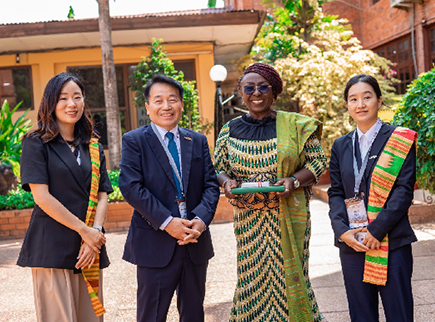A regional workshop on the interpretation and presentation of World Heritage Sites in Africa opened in Accra on Monday, bringing together heritage professionals, policymakers and experts from across the continent to strengthen knowledge, collaboration and community-centered approaches in heritage management.
Organised by the Ministry of Tourism, Arts and Culture, the Ghana Museums and Monuments Board (GMMB), the African World Heritage Fund (AWHF) and the International Centre for the Interpretation and Presentation of World Heritage Sites (WHIPIC), the workshop is supported by the Ghana Commission for UNESCO and the UNESCO Office in Accra.
Madam Abla Dzifa Gomashie, Minister of Tourism, Arts and Culture, opening the workshop, said the gathering marked “a significant step in our collective journey in strengthening the protection, management and communication of Africa’s rich
culture and heritage.”
She said the meeting followed a successful online session that laid the theoretical and practical foundation for understanding heritage interpretation, adding that the in-person engagement would deepen conversations, sharpen perspectives and build networks across the continent.
She said the week-long workshop aimed to equip African heritage professionals with stronger tools, shared insights and community-focused strategies to ensure that the continent’s stories were preserved, protected and told with authenticity, inclusiveness and pride.
“We are now gathered here in person to deepen our understanding of real issues, share our experiences and build networks that will advance heritage interpretation across the continent. Hopefully, we will resolve to work together and not in silos.”
The Minister stressed that heritage interpretation was not simply the presentation of historical facts, but “a pragmatic attempt to bring valuable meaning to stories connecting the past to the present,” helping communities and visitors appreciate the deeper significance embedded in heritage places.
She said Africa’s forts, castles, relics, oral traditions, music, folklore and other cultural expressions captured on the UNESCO World Heritage List reflected the continent’s resilience, identity and creativity, requiring strategic, authentic and community-based interpretation.
“Our stories must be told in a strategic way to shape how the world perceives Africa, and how our young generation values their origin. We must be in charge of the narrative of our story.”
Madam Gomashie noted that aligning heritage work with UNESCO Culture 2030 indicators and the Sustainable Development Goals would contribute to sustainable tourism, community development and cultural education.
She commended the African World Heritage Fund and WHIPIC for their continued collaboration with African member states and reaffirmed Ghana’s readiness to support continental efforts to develop the cultural sector.
The Minister urged participants to explore innovative strategies that placed local communities at the center of heritage narratives. “Too often, the conversation is in the capital cities among intellectuals, but the owners of these narratives are the people in the local communities,” she said.
She expressed confidence that the outcome of the workshop would strengthen heritage management frameworks and shape policies reflecting Africa’s shared aspirations.
Dr Albino Jopelo, Executive Director, African World Heritage Fund, said Africa, despite being the cradle of humankind and a hotspot of biodiversity, had only 154 sites out of more than 1,200 on the World Heritage List, representing less than 12 per cent.
This, he said, made the accuracy and relevance of narratives around existing sites even more critical. “Many of these narratives, still reflected colonial perspectives or failed to connect with African cultural identities and values.”
“Rethinking presentation and interpretation should not be seen as secondary. It is the very essence of why we should care as Africans to have these sites on the World Heritage List, emphasising the need for values, epistemologies and visions rooted in African worldviews.
He said the workshop would allow participants to share experiences, learn from Ghana’s management of its iconic forts and castles, and collectively identify ways to support state parties in addressing interpretation challenges.
Mr Carl Ampah, National Culture Programme Officer, UNESCO Accra, said the workshop aligned directly with UNESCO’s Strategy for World Heritage in Africa (2022–2029) and the Regional Action Plan (2021–2027), which emphasised strengthening capacities in interpretation and presentation.
He said interpretation was not merely the transmission of information, but a process that deepens understanding, connects communities to their heritage, and enriches the visitor experience.
“Through interpretation, heritage becomes a living resource. One that educates, inspires and bridges generations,” he said.
He said participants, would take part in lectures, group activities, discussions and field exercises, including visits to forts and castles across four regions, to connect theory with real-world challenges and develop more culturally grounded narratives.
Beyond the training, Mr Ampah said the workshop offered a valuable platform for building partnerships that would shape policies, management systems and new approaches across the continent.
Mr Heung Nyeon Kim, Deputy Director-General of WHIPIC, said the role of interpretation in safeguarding world heritage had never been more important, adding that the workshop would help deepen understanding, share best practices and expand cooperation across Africa.

